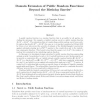1401 search results - page 64 / 281 » Randomness in Interactive Proofs |
COLT
2007
Springer
15 years 4 months ago
2007
Springer
Abstract. We propose simple randomized strategies for sequential prediction under imperfect monitoring, that is, when the forecaster does not have access to the past outcomes but r...
STOC
2010
ACM
15 years 7 months ago
2010
ACM
We prove that the complexity class QIP, which consists of all problems having quantum interactive proof systems, is contained in PSPACE. This containment is proved by applying a p...
103
click to vote
TPHOL
2008
IEEE
15 years 4 months ago
2008
IEEE
We describe a tutorial that demonstrates the use of the ACL2 theorem prover. We have three goals: to enable a motivated reader to start on a path towards effective use of ACL2; to...
105
click to vote
CADE
2010
Springer
14 years 11 months ago
2010
Springer
Abstract. In the context of deductive program verification, supporting floatingpoint computations is tricky. We propose an expressive language to formally specify behavioral proper...
CRYPTO
2007
Springer
15 years 4 months ago
2007
Springer
A public random function is a random function that is accessible by all parties, including the adversary. For example, a (public) random oracle is a public random function {0, 1}�...

